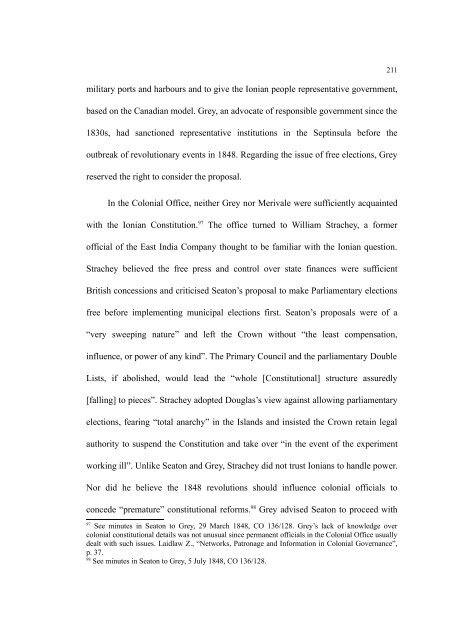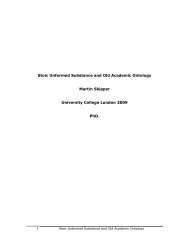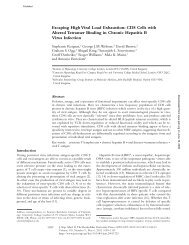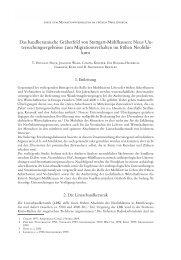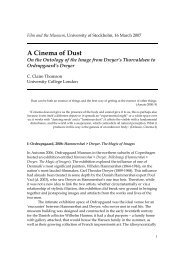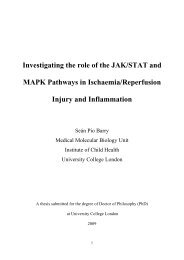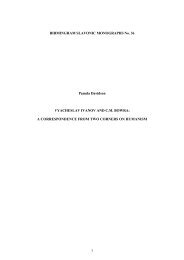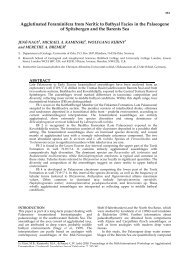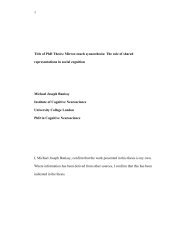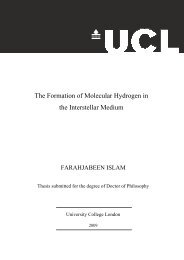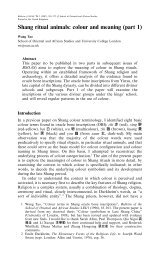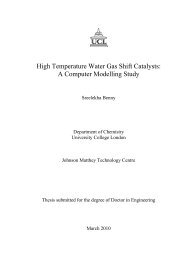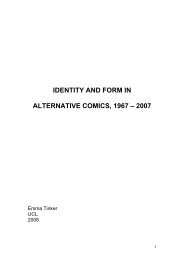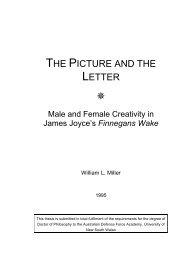- Page 1 and 2:
Constructing Ionian Identities: The
- Page 3 and 4:
Abstract Utilising material such as
- Page 5 and 6:
I owe a great debt to Alison Kitson
- Page 7 and 8:
Table of Contents Introduction: Con
- Page 9 and 10:
Introduction.......................
- Page 11 and 12:
examined the establishment of the I
- Page 13 and 14:
This thesis examines the processes
- Page 15 and 16:
journeys facilitated “the continu
- Page 17 and 18:
approaches and interpretations to p
- Page 19 and 20:
Fallmerayer and George Finlay about
- Page 21 and 22:
during the examination of the Ionia
- Page 23 and 24:
examine internationality, to explor
- Page 25 and 26:
‘nationality’ of the inhabitant
- Page 27 and 28:
Holland and Markides's focus on Gla
- Page 29 and 30:
century. 31 Her work demonstrates t
- Page 31 and 32:
“foundational text” of postcolo
- Page 33 and 34:
national identity. 45 She argued it
- Page 35 and 36:
emains an important contribution to
- Page 37 and 38:
prevailing historiographical myths
- Page 39 and 40:
such as John Stuart Mill argued “
- Page 41 and 42:
qualities of women and instilling t
- Page 43 and 44:
context of the Empire, this placed
- Page 45 and 46:
This focus on difference, which inc
- Page 47 and 48:
literature, particularly Homeric te
- Page 49 and 50:
fascinated by their local festivals
- Page 51 and 52:
theatre, opera houses and religious
- Page 53 and 54:
ut used it to explain elements of I
- Page 55 and 56:
years would be, I am convinced an e
- Page 57 and 58:
British ambiguities in their repres
- Page 59 and 60:
William Gladstone. Collectively the
- Page 61 and 62:
The British Parliamentary Papers pr
- Page 63 and 64:
governments. Politically, Venice or
- Page 65 and 66:
Economically, the Ionian Islands su
- Page 67 and 68:
permanent, ultimately had a long-te
- Page 69 and 70:
Summary of the chapters. Chapter on
- Page 71 and 72:
power as the most effective way to
- Page 73 and 74:
The conclusion reiterates the compl
- Page 75 and 76:
destroyed and occupied lucrative Fr
- Page 77 and 78:
Fifteen years of vigorous devotion
- Page 79 and 80:
to avoid the kind of slave revolt i
- Page 81 and 82:
at preserving the integrity of the
- Page 83 and 84:
authorities for this purpose”. 27
- Page 85 and 86:
political situation following the m
- Page 87 and 88:
centuries under Venetian and Russia
- Page 89 and 90:
the Septinsula, which led to the de
- Page 91 and 92:
evolt in 1791 led by Toussaint l’
- Page 93 and 94:
Maitland's administration “was an
- Page 95 and 96:
effectively summarised his characte
- Page 97 and 98:
on the state, character, and condit
- Page 99 and 100:
political behaviour under their pre
- Page 101 and 102:
In Madras, Bentinck held more liber
- Page 103 and 104:
Castlereagh complained of Bentinck
- Page 105 and 106:
and miscellaneous subjects. 105 The
- Page 107 and 108:
majority of laws passed during the
- Page 109 and 110:
and direction of European territori
- Page 111 and 112:
of these debates on 23 February 182
- Page 113 and 114:
despotism under the disguise of a r
- Page 115 and 116:
with “young men from England, …
- Page 117 and 118:
Ionian individuals. Goulburn interp
- Page 119 and 120:
119 “…We [are their] Guardians
- Page 121 and 122:
Henry argued Maitland’s obsession
- Page 123 and 124:
authorised to correct the abuses an
- Page 125 and 126:
“The Lord High Commissioner gover
- Page 127 and 128:
existing constitution of the Ionian
- Page 129 and 130:
Islands to deal with Ionian complai
- Page 131 and 132:
he ceded the territory of Parga, a
- Page 133 and 134:
who did not obey with exile and con
- Page 135 and 136:
was killed and three were wounded.
- Page 137 and 138:
ule in the Islands. 86 What mattere
- Page 139 and 140:
elieved authoritarian government wa
- Page 141 and 142:
consideration and benevolent thinki
- Page 143 and 144:
Conclusion. The Constitution of 181
- Page 145 and 146:
Chapter 3: Debating the reform of t
- Page 147 and 148:
followed: an improved criminal code
- Page 149 and 150:
Nugent’s policy in the Islands di
- Page 151 and 152:
eform without the Colonial Office
- Page 153 and 154:
To Kirkpatrick, a member of the Sup
- Page 155 and 156:
candidate in Liverpool in 1832 and
- Page 157 and 158:
passion, lack of self-control and r
- Page 159 and 160: Ionian families the economic burden
- Page 161 and 162: Constantinople and win assent to th
- Page 163 and 164: their surplus revenue. Moreover, al
- Page 165 and 166: Mediterranean. They were important
- Page 167 and 168: Douglas’s view of the “very bac
- Page 169 and 170: Charles Grant, Lord Glenelg, was a
- Page 171 and 172: Assembly retaliated by systematical
- Page 173 and 174: was sceptical of the property regul
- Page 175 and 176: He was familiar with imperial polit
- Page 177 and 178: unlawful. 112 Stephen’s opinion w
- Page 179 and 180: Mustoxidi. As European peoples with
- Page 181 and 182: material improvements in the Island
- Page 183 and 184: corruption, and in the next place,
- Page 185 and 186: supported Douglas’s argument that
- Page 187 and 188: Chapter 4: Seaton’s reform progra
- Page 189 and 190: learned European languages. 6 His l
- Page 191 and 192: political institutions and sought m
- Page 193 and 194: suggested by Gladstone during his m
- Page 195 and 196: British administration ruled the Is
- Page 197 and 198: societies failed politically unless
- Page 199 and 200: promised there would be no misuse o
- Page 201 and 202: Indies. In Lord Melbourne’s minis
- Page 203 and 204: New Zealand, where Grey proposed a
- Page 205 and 206: critics. Believing the issue would
- Page 207 and 208: policy to prepare the Ionians for r
- Page 209: the power of traditional institutio
- Page 213 and 214: wounded and several casualties for
- Page 215 and 216: Ionians, especially those without p
- Page 217 and 218: Parliament, trusting Seaton’s ass
- Page 219 and 220: were marked in the margin of the te
- Page 221 and 222: government practised in other parts
- Page 223 and 224: and was considered a “radical lea
- Page 225 and 226: too far on the franchise. 12 Privat
- Page 227 and 228: as the use of patronage, which he b
- Page 229 and 230: Ward believed Ionians ought to exer
- Page 231 and 232: civilised nation, was fit to govern
- Page 233 and 234: that at this time, they were not ye
- Page 235 and 236: a rural struggle against the ruling
- Page 237 and 238: and dismembering of some victims. 6
- Page 239 and 240: joined the Risospasti and expressed
- Page 241 and 242: and Cephalonian affairs. Papanicola
- Page 243 and 244: protection in favour of union with
- Page 245 and 246: there “was something in the posse
- Page 247 and 248: Although Ward privately opposed con
- Page 249 and 250: British protection and the administ
- Page 251 and 252: evised their regulations to make it
- Page 253 and 254: the Senate took the recess of Parli
- Page 255 and 256: have been formed in the English sch
- Page 257 and 258: Islands and making Corfu a colony,
- Page 259 and 260: the existing penalties for direct p
- Page 261 and 262:
only get support if he offered patr
- Page 263 and 264:
as his opinions regarding Ward's fa
- Page 265 and 266:
successor's, Sir John Young's, tenu
- Page 267 and 268:
offered a critical view of British
- Page 269 and 270:
egan in November 1853 following Rus
- Page 271 and 272:
people”. 16 The Risospasti used t
- Page 273 and 274:
when dealing with the Assembly. 25
- Page 275 and 276:
accept Ionian candidates. Excluding
- Page 277 and 278:
superiors to be apprehensive of his
- Page 279 and 280:
advocated the union of the Islands
- Page 281 and 282:
problems of British rule in the Isl
- Page 283 and 284:
Gladstone entered politics as a Tor
- Page 285 and 286:
greater responsibility over their o
- Page 287 and 288:
Islands connected to Britain. Like
- Page 289 and 290:
shared. 85 Gladstone was also an ou
- Page 291 and 292:
Ionian Protectorate in the Colonial
- Page 293 and 294:
serve as Lord High Commissioner for
- Page 295 and 296:
“presents at once the symptoms of
- Page 297 and 298:
esulting in the rise of a radical n
- Page 299 and 300:
that, with time, the Ionians would
- Page 301 and 302:
emaining members nominated by the L
- Page 303 and 304:
elationship with a “quarrelsome
- Page 305 and 306:
autocratic measures in ruling the E
- Page 307 and 308:
impossible. The geographical positi
- Page 309 and 310:
nominations were by the Lord High C
- Page 311 and 312:
friend Sidney Herbert that his cons
- Page 313 and 314:
and imperial supremacy. In the end
- Page 315 and 316:
for the post. After the fall of Der
- Page 317 and 318:
tone, claiming “the greatest obje
- Page 319 and 320:
and other Peelites, “dedicated to
- Page 321 and 322:
Prorogation of the Assembly continu
- Page 323 and 324:
providing for the substitution of a
- Page 325 and 326:
prorogued the Assembly for six mont
- Page 327 and 328:
him was that even the most trusted
- Page 329 and 330:
condition would move them away from
- Page 331 and 332:
conclusive and Storks’s request w
- Page 333 and 334:
inclusion of Ionians in examination
- Page 335 and 336:
they were not suited for “self-go
- Page 337 and 338:
candidates had the “moral courage
- Page 339 and 340:
Unlike his predecessors, Storks did
- Page 341 and 342:
The Colonial Office defended Storks
- Page 343 and 344:
capital. 112 However, such desires
- Page 345 and 346:
good impression “with his simplic
- Page 347 and 348:
In 1862, Palmerston found a solutio
- Page 349 and 350:
At the time of the rumours the Colo
- Page 351 and 352:
advantages of personal security and
- Page 353 and 354:
Conclusion In the aftermath of Glad
- Page 355 and 356:
Conclusion During their years as a
- Page 357 and 358:
Correspondence between the Lord Hig
- Page 359 and 360:
deserved either representative or r
- Page 361 and 362:
constitutional reforms, he introduc
- Page 363 and 364:
justify Ionian unfitness for respon
- Page 365 and 366:
constructed binary oppositions and
- Page 367 and 368:
British parliamentary papers, XXXII
- Page 369 and 370:
Lear E., Views in the Seven Ionian
- Page 371 and 372:
Synedriou, [Proceedings of the 4th
- Page 373 and 374:
Panioniou Synedriou [Proceedings of
- Page 375 and 376:
Chytitiris G., “Young and Gladsto
- Page 377 and 378:
Dixon C. W., The Colonial Administr
- Page 379 and 380:
Hall C. and Rose S., “Introductio
- Page 381 and 382:
Iremonger L., Lord Aberdeen, (Londo
- Page 383 and 384:
Knox B. A., “British Policy and t
- Page 385 and 386:
Makris T., “I eleutherotipia ke I
- Page 387 and 388:
Morrell W. P., British Colonial Pol
- Page 389 and 390:
Paximadopoulou-Stavrinou M., Oi eks
- Page 391 and 392:
Sainty J. C., Colonial Office Offic
- Page 393 and 394:
Stringos A., I Epanastasi tou ‘21
- Page 395 and 396:
Woodhouse C. M., The Greek War of I
- Page 397:
Tumelty J. J., “The Ionian Island


